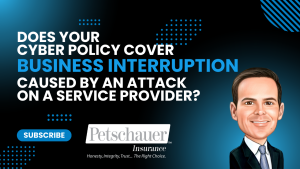Mitigating Cyber Risks of Human Error
Still, it’s been the same way for 10 years. People are what get breached, not systems for the most part for businesses. Especially small to mid size businesses. It’s the people that are breached through some type of process, be it phising, spear phishing, social engineering that makes someone just make a distracted incorrect decision and that opens the gate for the breach to occur. And then many things can occur because of that.
So I think one of the things I just want to say is – if you’re not doing both automated training with your IT team, you need to ensure that that’s occurring. So if you’re unsure, ask, you also need to make sure that you’re getting reporting of what’s happening, right? Not just that you know what’s happening, that’s not enough. You need to be getting reporting on what is happening, how are people responding and engaging with that, what are the results, and who are making the incorrect decisions?
And you need to make sure that whoever is making those incorrect decisions are getting more formalized live training. We do that for instance, per quarter, we have quarter reporting and then people that have made multiple incorrect responses to the test in the previous six months, you know, we make sure that our clients send those people to our live training that we hold every quarter. And that’s proved very popular and effective and I’m pretty sure if you’re working with an IT team, they can do the same thing very simply.
But, you know, it’s type of like the Pareto principle, the 80/20 rule. You know, if you’re blocking and mitigating 20% of the key risk, you’re gonna increase your security by 80%. Because the key foundational risks are the same for everybody. You mitigate those, you’re gonna increase your risk, I mean, decrease your risk immensely. And it makes you the more protected, harder to risk entity, which means that you’re not going to be the go to firm for these cyber criminals. It’s like the old adage, you know, have the best alarm in your neighborhood, not the best alarm that’s available.
We’d be happy to review your insurance coverage options with you! Give us a call at 516-419-5050 or visit https://jpins.com.









